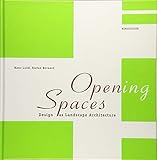Open(ing) Spaces : Design as Landscape Architecture / Stefan Bernard, Hans Loidl.
Material type: TextPublisher: Basel : Birkhäuser, [2014]Description: 1 online resource (192 p.)Content type:
TextPublisher: Basel : Birkhäuser, [2014]Description: 1 online resource (192 p.)Content type: - 9783038214878
- 9783038212232
- 712 23
- MLCM 2017/43149 (T)
- online - DeGruyter
| Item type | Current library | Call number | URL | Status | Notes | Barcode | |
|---|---|---|---|---|---|---|---|
 eBook
eBook
|
Biblioteca "Angelicum" Pont. Univ. S.Tommaso d'Aquino Nuvola online | online - DeGruyter (Browse shelf(Opens below)) | Online access | Not for loan (Accesso limitato) | Accesso per gli utenti autorizzati / Access for authorized users | (dgr)9783038212232 |
Frontmatter -- Inhalt -- Talking about design – a few introductory remarks -- “In the form of open space” -- [1] Form and forming -- [2] Designing and design -- [3] Space - place - path -- 3.1 Creating space (“space”) -- 3.2 Creating focal points (“place”) -- 3.3 Movement and access (“path”) -- [4] Design qualities -- 4.1 Fundamentals of good design -- 4.2 Characteristics of good design -- 4.3 Repetition as a tool -- Literature -- Authors
restricted access online access with authorization star
http://purl.org/coar/access_right/c_16ec
“What does the landscape architect actually do as a design?” The authors investigate this seemingly simple question. What resources are available for designing open spaces? What part is played by conditions deriving from nature? How are locations and spaces created in the open air, how are paths routed and boundaries set, how are hard and soft materials used? Drawing on practical and theoretical experience, this introduction, often used as a textbook, reveals the central components of design and the intellectual paths followed in the design process.“The book is not so much for reading but for doing. It plays with shapes, imagining how people feel in these shapes and seeing how shapes create a different experience of landscape. Vegetation can make the relief of a hill clearer, less clear, indistinct or hidden. The authors show this by sketches illustrating the text … As an example of the way Loidl and Bernard set their readers thinking for themselves, I "e what they regard as good design: ‘The paradox of a good design solution: more uniformity needs more variety.’Food for thought. Or read Open(ing) Spaces.” (Martin Woestenburg in 'scape, 2006)
Mode of access: Internet via World Wide Web.
In English.
Description based on online resource; title from PDF title page (publisher's Web site, viewed 29. Nov 2021)


